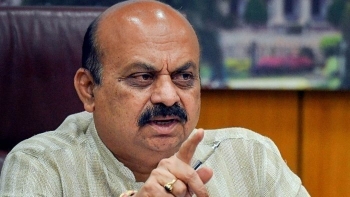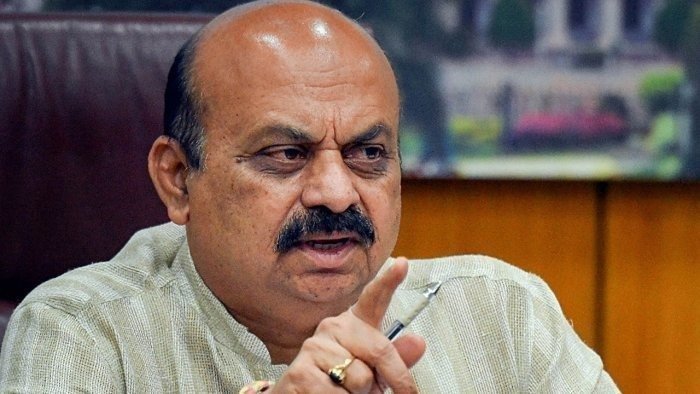
.png) John Dayal
John Dayal

Basavaraj Somappa Bommai, who will be 62 years on 29 January 2022, is a fast learner. His political learning, rather than his age, is now of great importance to the Christian and Muslim population of Karnataka, the state he now governs as the Chief Minister.
The state’s anti-conversion law, or Freedom of Religion Bill if you love euphemisms, is the blood sacrifice he has offered to his political gods to retain his chair. Muslims and Christians form only 12.92% and 1.87% respectively in the state’s 6.1 crore population [2011 Census] which is less than their representation in the national population.
Though he is now a leader of the Bharatiya Janata Party and was once deemed to be close to Y. S. Yeddyurappa, the multi-term Chief Minister and Lingayat caste supremo in the party, Bommai was not always in the BJP; in fact, he has never been in the Rashtriya Swayamsewak Sangh, the powerhouse behind the party.
His upbringing and political training were in the secular thesis of the Janata Dal in which his father, the late S.R. Bommai, was a towering figure. Students of Indian constitutional history remember Bommai Senior as the man who contributed to safeguard the autonomy of the states by getting the Supreme Court to agree that the Union Government could not arbitrarily sack regional governments.
Bommai inherited his father’s standing in their Lingayat caste. He joined the Bharatiya Janata Party as late as 2008, soon becoming Yeddyurappa’s obedient and trusted aide holding important ministerial portfolios.
It was then that Bommai also had his conversion, suddenly emerging as a strongman handling confrontations between the Muslims and the majority Hindu community.
With Tamil Nadu as the bastion of Dravida parties, Kerala given to choosing between the Congress and the Marxists, and the Telugu speaking Andhra and Telangana closed to anyone else, Karnataka has been seen by the RSS and the BJP as their solitary gateway to the South. The schism between the Lingayats, Vokkaliga and Dalits, greases its path, as does language, with Kannada, Konkani, Tamil in the capital Bengaluru and Marathi in the second capital Belagavi easy tracks for their cadres.
After Yeddyurappa’s removal as Chief Minister, Bommai has reason to feel his chief ministership too is transient. A firm hand in dealing with religious minorities becomes important in earning brownie points with the Modi-Shah-Bhagwat reigning deities.
His anxieties are very real. The controversial anti-conversion law which has been crafted as much for the Muslims as for the Christians and goes far beyond the one the saffron-clad Chief Minister of Uttar Pradesh imposed on his state, was in many ways his trump card.
He braved a well organised civil society resistance, ably led by Bangalore Archbishop Peter Machado, Much is seen in the party leadership in New Delhi patting him on the back within days of the state Assembly passing the Freedom of Religion Bill 2021 in the last session. He then did not pursue the Bill in the Upper House, or Legislative Council, where the party does not have a clear majority; but he is sure that in the new year, the political complexion of the Council would change, and the Bill would be passed.
Former Chief Minister and Congress leader Siddaramaiah has said, “The Congress will scrap the anti-conversion bill within a week of the party coming to power or the first session of the State Legislature after coming to power; there is no doubt about it.”
But critics point out it was a Congress government that passed a similar law in Himachal Pradesh and did not scrap earlier anti-conversion laws in other states when it came to power. The Congress, alas, is no longer seen by many as the main bulwark against the sort of highspeed march to a Hindu Rashtra that the BJP leadership has geared up nationally, and in Karnataka.
The agitations have all but stopped as civil society, Muslim and Christian groups mull the legal option. A legal challenge will have to wait till the Bill becomes law. There are several stages before that happens. It will pass through the Legislative Council which, technically, can suggest some modification, before it is presented to the Governor for assent. It is only after the administration writes out the rules that the Bill becomes operational. Then, it can be challenged in the High Court.
Patently, the Bill has been raced through so far. It was, sort of, copy pasted from the existing laws in other states, notably Himachal and Uttar Pradesh, and then honed by enhancing coverage and punishments.
It is in these enhancements that this Bill, and perhaps some other state laws also, face challenges in the High Court and then in the Supreme Court. The brilliant Constitutional lawyer and human rights activist Dr Colin Gonsalves said this law can and should be challenged both for its constitutional validity and for its potential to aggravate the existing pace of polarisation in the country. Many others see the Karnataka Bill, when it becomes law, will weaponize the targeting of Muslims and Christians as no other law has been able to do.
The twin Achilles Heels of the Bill are in its sections on marriage between persons of different religious communities – the groom’s minority religion as the main issue – and the time frames, penalties, and family objections, devolving on the couple, the clergy involved.
This is more visible and implicit in conversion to Christianity where baptism and clergy have a more visible role.
The Karnataka Bill specifically empowers parents and siblings of the persons, especially the woman, in objecting to the marriage. It goes way beyond other similar laws in giving the same powers to just about anyone else even if they have no other locus standi than being members of the majority community, political parties and religious nationalistic non-state actors such as the RSS.
The interference of all these groups, parents included, had been an issue even in the nationally operational Special Marriages act. In most cases where the couple belonged to different religions, castes, or even socio-economic strata, parents would go to any extent to prevent a marriage once they come to know of it through the government marriage office sending the notice to their home. Often, the women would be sent away, hurriedly married off, beaten, and bullied into submission to walk away from the marriage. Occasionally, she or her lover, or both, would be killed.
An editorial in The Hindu noted that Karnataka has now made ‘a promise of marriage’ a means of unlawful conversion. “It is needless to say that the idea of presuming that a conversion has or is about to take place alongside an inter-faith marriage is patently unconstitutional as it interferes with the right to privacy, marital freedom and freedom of belief.”
The editorial adds: “Anti-conversion laws have been upheld by the courts in the past on the ground that conversion by allurement, force or fraud poses a threat to public order and should be curbed. However, the only threat to public order seems to arise from rampaging groups out to create social discord.”
The Gujarat High Court has stayed provisions of a State law that made conversion ‘by marriage’ an offence, pointing out that it placed in jeopardy all marriages of those between two different faiths.
The government of the National Capital Territory of Delhi recently issued an order to all area magistrates and Marriage offices not to send notices to parents of couples under Special Marriage Act. The order came after a contempt case was filed before Delhi High Court in August seeking action against a Sub Divisional Magistrate whose office had sent a notice to an interfaith couple’s parents last year.
Following the official intimation, the woman had been detained by her family and was released only after her partner filed a habeas corpus before the court.
The Special Marriage Act was enacted to enable a special form of marriage for any Indian national, professing different faiths or desiring a civil form of marriage.
Civil society and minority religious groups have said that governments which profess such deep concern for communal harmony and want to stop all actions that jeopardise relations between minorities and the majority community should enact laws to curb targeted hate which precipitates violence against vulnerable individuals and groups.
One Christian church leader said: “I am very concerned at the way in which hatred is being normalised in India. The recent hate speeches at the Dharma Sansads at Haridwar in Uttar Pradesh and Raipur in Chhattisgarh are signs of it. The FIR lodged by the Raipur Police only mentions the speech against Mahatma Gandhi and not the calls to distribute weapons to Sanatani Hindus to wage war for a Hindu Rashtra.”
“Videos of these meetings show the sadhus laughing with the police when they went to file a complaint against the Muslim religious leaders of Haridwar. They had the nerve to tell the police that they expect them to be biased and support them. This impunity has never before been seen and it has been enabled systematically.”
Not that the attackers, now generically labelled as Hindutva members distinct from religious terrorists, need more than the existing motivation to attack Muslims and Christians. Just on Christmas Day, 16 attacks on churches big and small, congregational meetings and celebrations took place. They were as spread out as Haryana, UP, Assam, Madhya Pradesh, Chhattisgarh and, of course, Karnataka.
According to the Religious Liberty Commission of EFI, while Christians are expected to have trouble in states like Uttar Pradesh, Madhya Pradesh, Karnataka, and Chhattisgarh with a history of targeting the community, some states like Assam and Haryana are new on the list.
“We are no longer safe in our prayer halls, Churches or even our homes. The government is seen doing nothing to protect the victims and to punish the offenders. The law machinery is too busy carrying out the will of their political masters and in many cases it is the police that targets worship services accompanied by members of right-wing Hindutva groups," said a clergyman.
The new Bill adds to the sense of fear, and gloom.